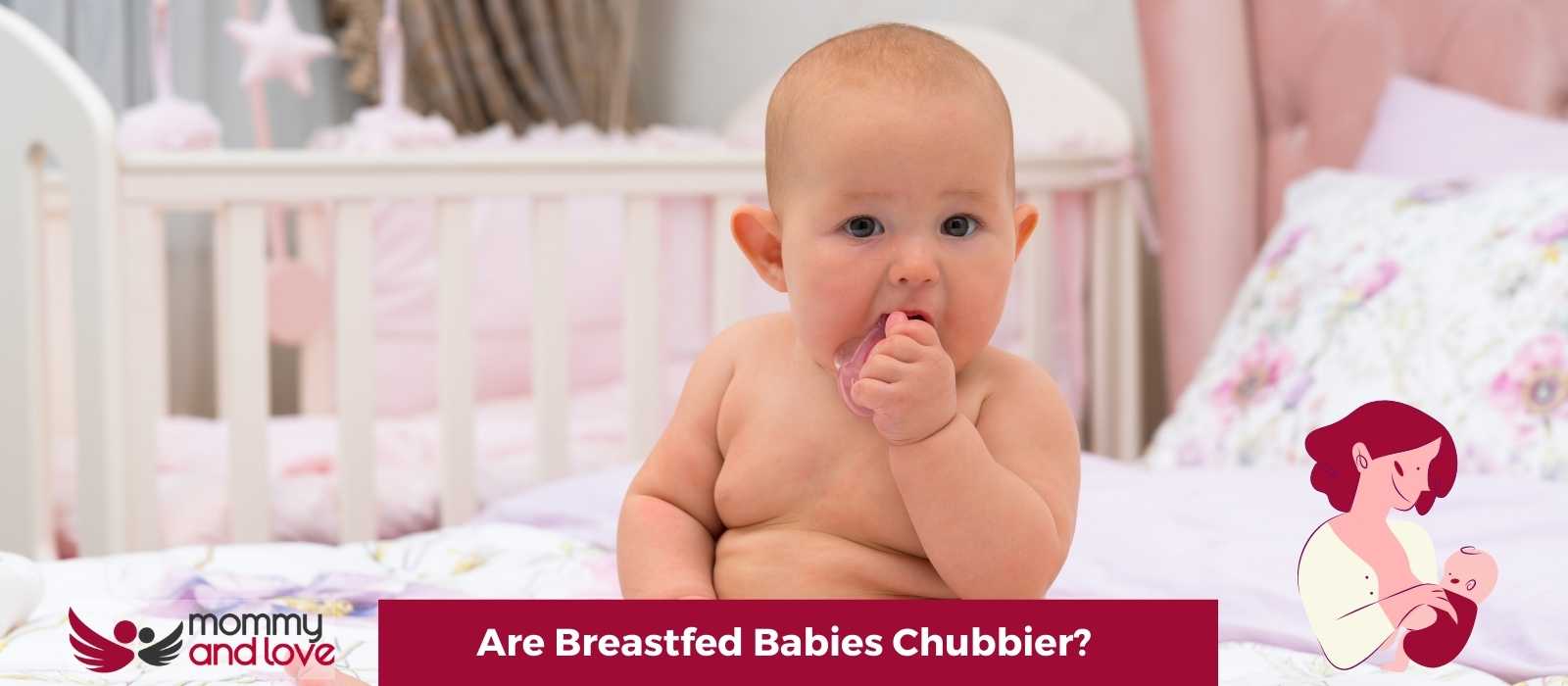Newborns gain weight rapidly in the first year, usually doubling their birth weight by the time they are six months old. Breast fed babies have a particular reputation for piling on the pounds, but are breastfed babies chubbier than formula fed babies?
What Are the Benefits of Breastfeeding?
Breast milk is biologically the best food for your baby. It’s good for your baby’s gut, it’s good for their brain, and it provides a ton of other benefits as well. Parents shouldn’t worry about whether their breastfed baby or children is chubbier than formula feeding babies.
Your breast milk is the perfect food for healthy weight gain and your baby’s general physical health. Breastfed babies enjoy a lower risk of heart disease and obesity in later life.
Mothers should remember that all babies have uniquely developing bodies that grow at different rates , regardless of being breastfed or formula fed. Your baby or child may simply be following their own growth chart- which might include occasional periods of rapid weight gain due to growth spurts. A baby with an average birth weight is expected to double his birth weight by the time he is six months old- that’s a lot of growing!
A baby’s body will also break down sugars and fats at a different rate when they come from breast milk as opposed to formula feeding, so there are fewer calories in breast milk which means no significant weight gain. Breastfeeding actually generally leads to babies with a lower body mass index (BMI) than formula-fed infants, even in spite of those chubby thighs.
Breastfeeding infants generally weigh less than formula-fed infants, even after they start to eat solid foods. While exclusively breastfed babies might well be chubbier, this difference with formula babies tends to even out over time, so rapid weight gain in infancy will not be a problem. By the time a breastfed baby is one year old, they are usually thinner than a formula-fed baby.
Should I Worry if My Baby Is Chubby?

There are a number of factors that can affect a baby’s weight gain, including genetics and breastfeeding patterns.
In most cases, breast fed chubby babies are perfectly healthy and will eventually slim down as they grow older.
Still, the best way to give your baby the nutrition he or she needs is by breastfeeding. Breastmilk contains over 50 essential nutrients that help develop healthy skin, hair, and nails as well as provide protection against diarrhea and disease control.
In fact, some studies have found breastfeeding could reduce an infant’s chances of becoming obese by up to 60% .
In most cases, exclusively breastfed chubby infants and children are perfectly healthy and will eventually slim down as they grow older.
Can a Breastfed Baby Be Overweight? (9 Facts to Know)
Breastfeeding your baby is the best way to provide them with all of their nutritional needs. Numerous studies show that children who were breastfed as babies tend to be thinner than children who were fed with formula milk.
1. A breastfed baby is unlikely to be overweight, even if the mother has an overactive milk supply.
2. If the baby is exclusively breastfed, he or she may gain extra weight if the mother eats a high-fat diet and lots of excess fat.
3. Breastfed babies should be weighed and measured regularly to track the baby’s growth.
4. If a breastfed baby is overweight, the mother should talk to her doctor about how to safely reduce the baby’s weight to avoid a higher risk of childhood obesity.
5. The baby should also be given plenty of opportunities to be active throughout the day.
6. Some tips for helping an overweight breastfed baby lose weight safely include breastfeeding more often, avoiding high-calorie foods, and getting regular exercise.
7. It’s also important to make sure the baby is getting enough nutrients, so the mother may need to give her baby vitamin and mineral supplements.
8. Overweight breastfed babies should not be put on a diet but should eat healthy solid foods.
9. The baby’s pediatrician can help the mother determine how many calories she needs to consume each day.
Why Are Breastfed Babies Fatter Than Formula Fed Babies?
While breastfed babies are notorious for chubby thighs, breast-fed infants are actually often thinner than formula-fed infants. This is true even after they start to eat solid foods. Breast-fed babies are also usually shorter than formula-fed babies.
By the time a breast-fed baby is one year old, they are usually thinner than a formula-fed baby. This is because breast milk contains the right amount of fat, sugar, water, and protein that babies need to grow at the proper rate. It has all the vitamins and minerals a baby needs as well.
Finally, it is also possible that there are genetic differences between breastfed and formula-fed babies that account for the difference in weight.
However, it is clear that human milk has many benefits for both mother’s physical health and babies mental development and developing body, and it is recommended that women try to breastfeed their newborn baby and infants whenever possible and avoid formula feeding.
Should I Worry if My Baby Is Chubby?
Babies come in all shapes and sizes, and there is no one perfect weight or size for a baby. Some babies are chubby due to rapid growth and gain quickly, some are thin, and most babies fall somewhere in between.
So should you worry if your baby is on the chubby side?
A chubby baby does not mean he is an overweight child. There are both pros and cons to having a chubby baby, so it’s important to weigh the pros and cons before making a decision about whether or not to worry.
On the positive side, chubby babies are often seen as cuter and more huggable than their thinner counterparts. However, there are also some negative aspects to being a large child at such a young age. Chubby babies may be likely to be obese and related health problems later in life. They may also find it harder to move around and be as active as their thinner peers.
As a parent, it is important to help your child maintain a healthy weight by providing nutritious food choices and encouraging physical activity to avoid the increased risk of obesity.
My Breastfed Baby Is Chubby. Is Formula Feeding Better?
As a matter of fact, its’s likely that the opposite is true! Studies have actually found that exclusive breastfeeding can reduce your child’s risk of obesity in childhood and later life by up to 60%. It’s very hard to over feed an exclusively breastfed baby. Your healthcare provider can advise if your baby’s weight gain is appropriate. In the meantime, remind yourself of the benefits of breastfeeding.
It’s actually quite difficult for an exclusive breastfeeding baby to gain “too much weight” and often those chubby thighs are just baby fat that disappears when your child starts moving. A large breastfed baby is not an unhealthy baby! Remember that fat is an essential part of your baby’s diet.
Are Breastfed Babies Chubbier? Here’s the Bottom Line
As a parent, it is important to pay attention to your baby’s individual habits and health, rather than just their weight. Formula milk is unlikely to assist your baby in dropping baby fat or stop them gaining weight, and is associated with other health problems. Obesity is actually more likely in formula fed infants.
If your child does seem to gain weight too quickly, it is much more likely to be linked to high fat solid food rather than mother’s milk. Take a look at our guide on everything you need to know about Baby Led Weaning to ensure your baby has a healthy relationship with food.

This article was written by Sandra Baker – full time writer and the mother of four amazing kids (including twins!)
She’s also a breastfeeding counselor and has spent years helping new parents learn how to care for their children. When she’s not writing or caring for her children, Sandra likes to spend time reading and taking walks with her husband.




